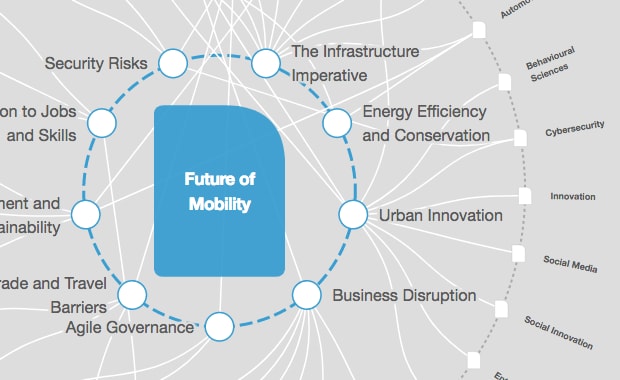These tiny electric tuk-tuks are taking on Uber in Stockholm

Bzzt offers an Uber-like service, but instead of cars it uses tiny electric mopeds. Image: REUTERS/Gleb Garanich - RTX1WOFS

Explore and monitor how Mobility is affecting economies, industries and global issues

Get involved with our crowdsourced digital platform to deliver impact at scale
Stay up to date:
Mobility
There’s much talk about a coming mobility revolution, led by electric vehicles and other futuristic modes of transport. But a startup from Gothenburg called Bzzt is taking a more hands-on approach - using Stockholm as its launchpad.
Bzzt offers an Uber-like service, but instead of cars it uses tiny electric mopeds that can travel up to 45 kilometers per hour. The company’s vision is to make taxi services available to everyone in the inner city, by offering prices comparable to public transport.

“Our vision is to allow everyone to travel by taxi. And to improve society at the same time,” says Per Nyrenius, Bzzt’s co-founder and marketing director.
After trialling the service with three of their vehicles in Gothenburg over the last two years, Nyrenius and his cofounder, CEO Sven Wolf, have now taken on their true target market: Stockholm.
Last Wednesday, Bzzt set its fleet of 18 vehicles loose on the streets of Stockholm
The podtaxi’s, as Bzzt calls them, resemble an electric tuk-tuk that you would normally expect to see in a Southeast Asian city. They are manufactured by Clean Motion, a company backed by Skype’s founder Niklas Zennström.
A podtaxi can be ordered through the Bzzt-app anywhere within the inner city of Stockholm. The customer only pays for meters travelled, which means a fixed fee of 30 krona ($3 dollars) per kilometer, regardless of traffic. So how does Bzzt manage to make the service so cheap? Wolf explains:
“A normal taxi drives customers on average 15 to 20 minutes per hour, which is very inefficient. We have a system, and a proprietary software, that optimizes our fleet. It gives us a better occupancy rate, and that’s why we can ask lower prices and still pay a good salary to our drivers.”
“Our service only costs us money when we are in action, since we pay salaries on an hourly basis. We know it’s profitable as long as we have a sufficient volume of customers,” Nyrenius fills in.
Bzzt challenges Uber with environmental thinking and ‘better terms for drivers’
Although Bzzt was originally inspired by Uber, and briefly partnered with them in Gothenburg (by offering their taxipods through the Uber-app) Wolf points to several differences between these two disruptors of urban transport.
First of all, Uber “has missed the environmental aspect completely,” says Wolf. Bzzt-vehicles are emission-free, and once they are not taking customers, the vehicles are parked in an underground garage.
This map shows the inner city Stockholm area, where Bzzt's service is available.Bzzt
The second difference concerns how the two companies relate to their drivers. Uber has lately taken a lot flack for not considering their drivers as employees. Bzzt has a different strategy.
“All our drivers are employed with written contracts, which are subject to an agreement with the Swedish Transport Workers union. We don’t need to exploit our staff to be profitable. We do it by keeping our costs low – on our fuel, vehicles and insurance,” Wolf says.
Bzzt wants to grow its fleet in Stockholm to 200 podtaxi's – and crowd out fossil vehicles
Bzzt is currently going all-in on Stockholm by offering new customers their first ride for free. Nyrenius hopes to improve the service as demand picks up, making average waiting times "not longer than three to four minutes".
By the end of this year, the company aims to expand its fleet in Stockholm to 50 vehicles, and then quadruple the fleet to 200 by 2018. Despite the imminent operational challenges of launching in Stockholm, the founders remain visionary about their service.
“It’s been a trend of sorts in recent years to democratize products and services; take for instance Spotify, which gives people access to all the music in the world. The same can be done with inner city taxi’s, while at the same time moving out fossil vehicles. What we’re really striving for is a better urban environment. The only way to do that is to create a product that – regardless of everything else – is so good that it becomes ubiquitous. And that way, the world becomes a better place,” Nyrenius says.
If everything goes well, Nyrenius and Wolf are looking to expand their revolutionary concept abroad. But for now, it’s up to Stockholmers to show if they’re up for the ride.

Don't miss any update on this topic
Create a free account and access your personalized content collection with our latest publications and analyses.
License and Republishing
World Economic Forum articles may be republished in accordance with the Creative Commons Attribution-NonCommercial-NoDerivatives 4.0 International Public License, and in accordance with our Terms of Use.
The views expressed in this article are those of the author alone and not the World Economic Forum.
Related topics:
The Agenda Weekly
A weekly update of the most important issues driving the global agenda
You can unsubscribe at any time using the link in our emails. For more details, review our privacy policy.
More on Emerging TechnologiesSee all
Agustina Callegari and Daniel Dobrygowski
April 24, 2024
Christian Klein
April 24, 2024
Ella Yutong Lin and Kate Whiting
April 23, 2024
Andre S. Yoon and Kyoung Yeon Kim
April 23, 2024
Simon Torkington
April 23, 2024
Thong Nguyen
April 23, 2024





